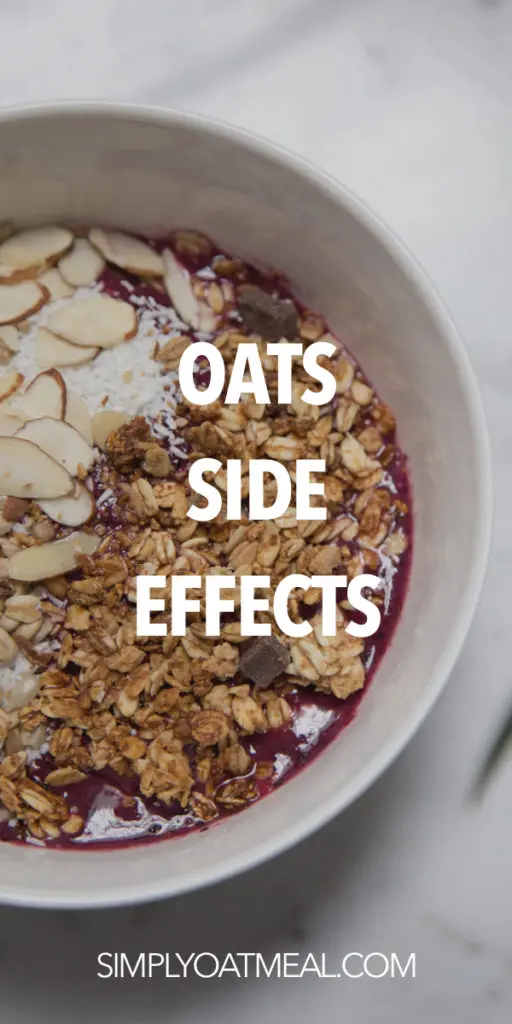Oats aren’t something you generally need to fear, that is unless you have a specific food allergy to oats. Aside from keeping the serving within moderation, here are a couple oats side effect that you should be aware of before you start consuming oats on a regular basis.
Oats are a plant-based source for valuable nutrition and a fiber-rich food that is low in fat and high in protein. However, there are unexpected results to reflect on before regular consuming the whole grain food.
Oats are most commonly used to lower cholesterol and reduce the risk of heart disease. Even though there are a number of reasons to consider adding oats to a healthy diet, the potential side effects may not be worth the risk for everyone.
Why should I add oats to my diet?
Oats contain vital compounds that are effective at helping to control appetite by promoting a feeling of fullness. The process of empting the stomach is slowed, and therefore lowers the absorption rate into the body and reduces blood glucose levels.
In addition to be used to help prevent heart disease, gallstones, colon cancer, and stomach cancer, the nutritional benefits of oats seem to be endless.
Oat bran and whole oats are used to help lower blood pressure, reduce total cholesterol, improve blood sugar levels and also aid indigestion problems including irritable bowel syndrome (IBS), diverticulosis, inflammatory bowel disease (IBD), diarrhea, and constipation.
On a topical level, oats have been proven to reduce swelling, irritation and itchiness when applied to the skin.
Are there any side effects or health risks associated with oats?
There are few reasons to be apprehensive of oats, of course that is unless you have an allergy to oats.
Oats have a tendency to cause intestinal gas and bloating. In order to minimize the side effects of eating oats, start with a small serving size and gradually increase as your body adjusts.
Oats and oat bran are high in both soluble and insoluble fiber. As your body becomes accustom to eating oats, the noticeable side effects will likely disappear.
The risks associated with gluten have given rise to concern about eating oats. If you are gluten-intolerant or have celiac disease, than oats are perfectly safe for you to consume.
Are oats and oatmeal really gluten free? Gluten intolerance has become a worldwide disease. Not everyone has it, but anyone with celiac disease. Oats do not contain gluten, unless they are contaminated by a wheat source in the field, harvest, or processing of the whole grain.
Are oats safe for celiac? Oats and oatmeal are naturally gluten free. Purchase gluten-free certified oats to guarantee that the oats are not cross contaminated with grains that contain gluten like wheat, barley or rye.
Do all oats contain Avenin? All oats contain the antioxidant avenin, even gluten-free oats. Even the the amino-acid protein is similar in structure to gluten, most people with celiac disease don’t seem to experience sensitivity towards it. As long as the oats are not contaminated with gluten, there seems to be no problem with the avenin in oats.

Other Special Situations & High-Risk Warnings About Eating Oats:
What happens if you eat raw oats? Raw oats contain the anti-nutrient phytic acid or phytate. This compound is found in grains, nuts, seeds and beans. It binds to some essential minerals like calcium, zinc and iron, and prevents your body from absorbing them.
Avoid this problem by fully cooking the oats, or soaking them for 12-16 hours to reduce the phytic acid. As a result, overnight oats have become the go-to solution for easily and effectively consuming raw oats.
Difficulty chewing food or swallowing problems: If encountered problems with chewing food fully or swallowing difficulty, then exercise caution when eating oatmeal. Poorly chewed oatmeal can lead to blockage inside the intestines that can cause serve issues.
Digestive tract disorders including the esophagus, stomach, and intestines: Oats delay the reaction of the stomach emptying sequence. As a result, digestive disorders could lengthen the time required for digestion and therefore lead to blockage within the intestines.
Pregnancy and breast-feeding: Oat bran and whole oats are PROBABLY SAFE to be ingested by pregnant and breast-feeding women, as long as the amounts are not consumed in excess.
Skin care and topical applications: Creams, lotions and ointments contain oats are LIKELY SAFE to use of the skin. Concerns may be raised over the other ingredients within the product. However, it is possible that putting products contain oats on the skin can cause skin to break out, dry skin or irritation on some people.
How much oatmeal should you eat a day?
A single serving of oatmeal offers remarkable nutritional value. However you incorporate oats into your diet, the benefits will be prevalent.
Of course there are slight differences between steel cut, rolled and quick, the advantages are still noteworthy. The best thing to do is find the type of oats that you like most, and that way you will enjoy eating them and not get tired of them too quickly.
Oats have been at the forefront of health and diet research for many years. The following serving amounts have been studied in scientific research:
- For high cholesterol: A single serving of rolled oats (46g) contains about 3 grams of beta-glucan fiber. This soluble dietary fiber is can be a nutritious part of a low-fat diet plan. Consider the numerous health benefits of adding fiber-rich foods to help reduce total cholesterol.
- For lowering blood sugar levels in people that have type 2 diabetes: High fiber foods such as whole grain oats or oat bran contain up to 25 grams of soluble fiber in a single serving with about 3 grams of beta-glucan. This valuable compound offers tremendous health benefits to the overall performance of the body.
- For weight loss: Beta-glucan slows the stomach emptying process. As a result, the feeling of fullness is extended to a longer duration. Consume oats and know that you’re getting a healthy dose of essential vitamins, minerals and antioxidants.
Is eating oatmeal everyday bad for you?
Oats are considered to be one of the healthiest grains. They are a gluten-free whole grain that is fiber-rich, low in fat, and high in protein. In addition, they contain an assortment of vitamins and minerals that are important for the body.
Many people eat oatmeal on a daily basis. Aside from avoiding allergic reactions or digestion disturbances, the concern would be to avoid massive amounts of added sugar.
In order to avoid added sugar, stick to plain and unsweetened oats and use your own blend of wholesome oatmeal toppings.
Stay away from the prepackaged instant oatmeal varieties that are full of sugar and artificial flavorings.
Is oatmeal a bad carb? Yes oatmeal is high in carbs, however it comes with lots of fiber that is both soluble and insoluble. Beta-glucan fiber helps to slow digestion within the stomach, which can help to reduce your appetite at the same time.
Do oats make you gain weight?
Oats themselves do not make you gain weight. In fact, the compound beta-glucan helps to slow the stomach emptying process, which help to extend the feeling of fullness.
There are two causes for concern to ensure you don’t gain weight from eating oats:
- Eat less: The number one cause for gaining weight is over eating. If you eat less, then you minimize the problem. Stick to eating the amount of calories for your recommended daily intake (RDI).
- Avoid added sugar: Pouring a mountain of sugar on top of your oatmeal is definitely going to lead to problems down the line. Prepackage instant oatmeal is often loaded with added sugar and artificial flavoring. Eat unsweetened oatmeal that is served with natural and wholesome oatmeal toppings.
Can oatmeal upset your stomach?
Very few people experience allergic reactions or sensitivity associated with the proteins found in oats. Here are few reasons why oats may upset your stomach:
Bloating and intestinal gas: Some people may experience different results than other, however bloating and intestinal gas seem to be relative.
Why do oats make me bloated? Oats contain high amounts of protein, fiber and healthy carb. The high fiber content can cause bloating in sensitive individuals.
Minimize the bloating by slowly exposing your body to gradual increases in oatmeal. Start with a small amount at first, and then slowly increase the portion size over time.
Does oats cause gas? When oats are combined with sugary toppings or prepackaged contents, this may contribute to the production of intestinal gas.
The production of gas is often caused by the bacteria in your intestines working hard to digest the protein and starch. Slowly build up tolerance to eating oats by starting with a small serving size and gradually increasing the portion over time.
Hydration level: Oats are a dried grain that is full of soluble fiber. When the oatmeal reaches you stomach, it has a tendency to absorb surrounding liquid.
If your body is not fully hydrated, then this could result in feelings of an upset stomach. Avoid this by serving porridge that is slightly thin and not super thick.
Does oats make you poop?
Contained within the high-fiber content of oats is a power combination of both soluble and insoluble fiber. The two types of fiber work together to help bulk up the stool, soften the mass and also make it easier to pass through the intestinal tract.
Why do I poop after eating oatmeal? Simply put, oats are packed with both soluble and insoluble fiber.
- Soluble fiber helps to gel up the stool, which enables it to pass through the body more efficiently.
- Insoluble fiber adds bulk to the waste, which speeds up how often your bowels need to empty.
Are oats bad for IBS? Fiber-rich foods can be helpful for IBS, however it can also make symptoms worse. It’s somewhat ironic that healthy foods can actually make symptoms worse.
Soluble fiber has demonstrated the ability to be soothing for diarrhea by helping to bind the loose stool. Irritable bowel syndrome can be caused by a number of factors, and therefore should be treated by a medical professional.

Dave
Monday 15th of August 2022
I have a problem with excess mucus in my intestines . Can oats aggravate that problem?
Joshua
Monday 15th of August 2022
This is a specific question that you should consult a dietician and/or physician. Good luck
Ben
Wednesday 22nd of September 2021
Great info